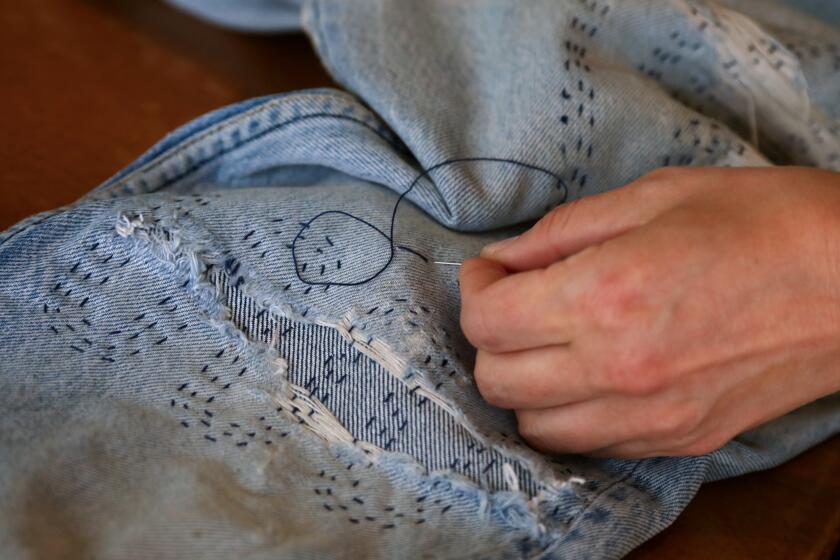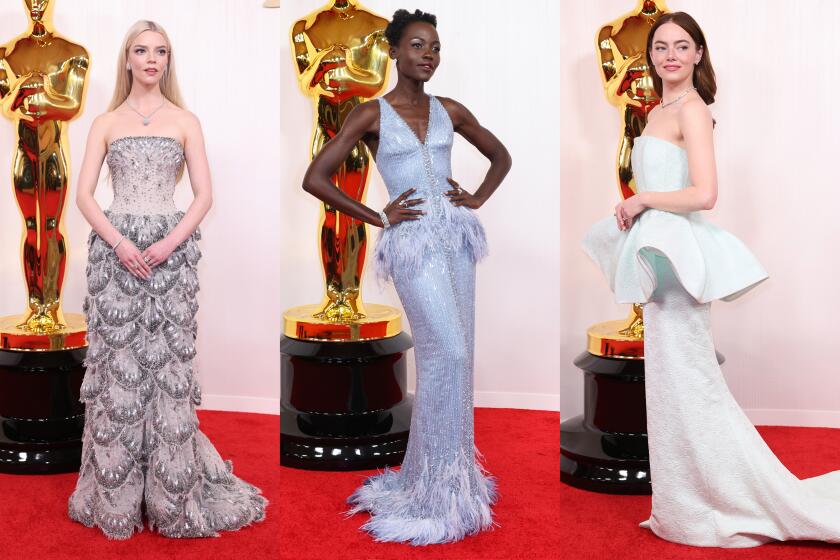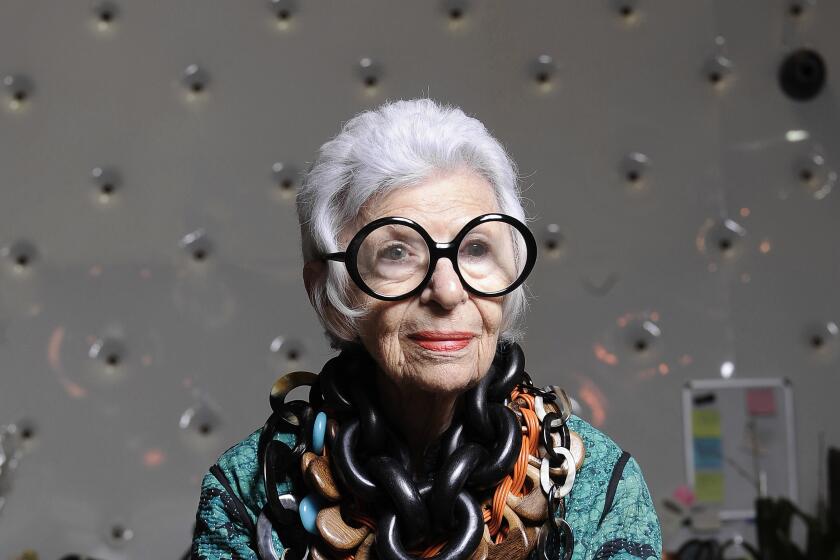Coonskin Cap Clings to ‘Crockett’
Heavy hangs the coonskin cap.
It’s been almost 50 years since Fess Parker donned the fuzzy headgear that launched the first blockbuster cultural phenomenon of the baby boom generation.
For the record:
12:00 a.m. Aug. 28, 2002 For The Record
Los Angeles Times Wednesday August 28, 2002 Home Edition Main News Part A Page 2 ..CF: Y 10 inches; 372 words Type of Material: Correction
Fess Parker film--A Column One story on Friday about actor-businessman Fess Parker misstated the 1954 release date of “Them!,” a science fiction film in which he appeared.
At its peak, the frenzy started by Parker’s Davy Crockett character helped sell 5,000 coonskin caps a day, causing the price of raccoon fur to jump from 25 cents a pound to $8. Before it was over, Crockettmania accounted for $300 million in sales of everything from Davy wristwatches to lunch boxes.
“I will immodestly tell you it was bigger than anything, ever, including The Beatles and Elvis,” Parker says in a rumbly Texas drawl as he cuts into a stack of hot cakes. Dressed in a work shirt and jeans, he eats breakfast frequently these days at his wine country inn north of Santa Barbara, where he pursues his second career as a developer, hotelier and vintner.
His wines earn far better reviews than his acting ever did. His patronage is sought by politicians. His generosity is well-known: He donated land for a park in Santa Barbara and he’s at the front of every fund-raiser’s Rolodex in the Central Coast.
But, try as he might, Parker never managed to escape the shadow of the coonskin cap. At first, it looked as if it would be the end of him. The Crockett craze lasted only a year, but he was so typecast by his boss, Walt Disney, that he couldn’t get other acting jobs. When he finally did, it was to play another guy in a coonskin cap, Daniel Boone.
The fans were unyielding. They wanted their hero to stay just as he was when he came into their living rooms during evenings in 1954--unblemished, accessible, upstanding. That was yet another burden--trying to live up to a Hollywood caricature.
Now 78 and looking forward to what might be his most ambitious project--a top-drawer resort hotel on the beach in Santa Barbara--Parker says he is at peace with his backwoods doppelganger.
“It wasn’t always a comfortable fit,” he says of the cap. But the passage of time has helped him rediscover “what a fabulous streak of luck I had.”
A couple years ago, he made an important connection. “I’ve learned a thing or two from Davy Crockett,” he said at the time. “I don’t give up.”
*
The first thing you notice about the man who mangled the English language on screen with phrases like “perzactly” and “discombobulated flutterbation” is his delicate, almost courtly manner. He calls visitors Mr. So-and-so, not by their first names. His staff--he employs about 500 people--refers to him as Mr. Parker, never Fess. And he becomes noticeably uncomfortable when asked how much money he has, joking that if “all the money I owed was income, I’d be well off.”
The only ostentatious bauble he shows off is a gleaming, air-conditioned Humvee, which he fires up after breakfast for a tour of his ranch in the yellow cattail canyons of the Santa Ynez Valley. The Humvee, which he calls a “Lincoln on steroids,” was a gift from his wife of 42 years and the rest of his family on his 75th birthday. The party was held at a lake on the ranch, next to a hand-built re-creation of the Alamo, the Texas fort where Davy Crockett and the rest of a small band made its last stand against the Mexican army.
About half of his 3,000 acres is in wine grapes. Parker’s other holdings include a partnership with Hilton in the Fess Parker Doubletree Inn on the beach in Santa Barbara, the 21-room Wine Country Inn in Los Olivos and the winery in Foxen Canyon. He also has a home in Montecito, not far from Oprah Winfrey’s.
A man for whom doing the right thing in just the right way matters a lot, he starts to park the Humvee at the rear of the winery, then backs out so that he can park in front. He says that offers the most scenic approach.
This fussiness, besides being very un-Crockett-like, is an object of mirth for family members who chide him for being too concerned with appearances. But he’s right. The view of the winery from the front is a dramatic one. Set back on what must be the largest and greenest lawn in this dry valley, the gabled building has a big, cool front porch. The whole thing resembles the Big House on a Texas ranch and a visitor half expects a gang of folks to come piling onto the porch in welcome. Instead, as Parker climbs up the steps, Shirley Borrow squeals, “I’ll just die.”
The 67-year-old Michigan tourist is almost beside herself at actually meeting him. Parker smiles and shakes hands. This is the part of the business that comes easily to him. Parker has no idea how many hands he has shaken in his lifetime, though he knows he shook 3,000 a day during the height of Crockettmania. “My hands got really sore,” he says. “Housewives [who squeezed hard] hurt the most.”
*
The real Davy Crockett was hardly Disney material. He was not born on a mountaintop and, needless to say, he did not kill a bear at 3, though at 41 he was still agile enough to dispatch 105 bears in six months. The real Davy was a rough-edged frontiersman who neglected his wives, drank with gusto and feuded with superiors.
While Disney’s vision of Davy Crockett was of a man who never took or gave offense thoughtlessly, the real Davy reacted this way when he lost an 1834 congressional race to a peg-legged opponent: “Since you have chosen to elect a man with a timber toe to succeed me,” he thundered, “you may all go to hell, and I will go to Texas.”
Parker’s early life, on the other hand, could have been drawn by Walt himself. He grew up the only child of a Texas merchant and a strong-willed mother. His father was “movie star” handsome, with coal dark hair, and operated a feed store in San Angelo. Just as his son would, the elder Fess had a way with people. “My dad would start down the street to pay the gas bill and it would take him 30 minutes to get there,” Parker says.
After a stint in the Navy in World War II, Fess Parker headed for Hollywood and USC, where he took a drama class from William DeMille, the older brother of director Cecil B. DeMille. After one scene, he asked the professor how to break into pictures. “I wouldn’t have any idea,” DeMille said.
Parker was undeterred. His break, though it hardly seemed so at the time, came in a bit part in the 1953 science fiction movie “Them,” a nuclear-age picture about supersized ants. For some reason, Walt Disney saw the picture. The rest, as they say, is in the bio. The first of three one-hour telefilms, called “Davy Crockett Indian Fighter,” had its premiere on Dec. 15, 1954. By the time the second show aired a few weeks later, the country was crazed for Crockett.
Crockett collectibles flew off department store shelves. Disney sent Parker on a tour of 42 cities and 13 countries. “In one place, the crowd pushed in a plate-glass window,” Parker says. Another time, “I ran for the car with the crowd chasing me. A girl jumped in and a guard hit her and shoved her out. It was a dangerous time.”
Then, as quickly as it began, the craze ended.
But its seeds had burrowed deeply into the brains of all those coonskin cap-wearing children. Men in business suits still approach him with tears in their eyes to say what Davy meant to them, Parker says.
Leo Braudy, a USC professor who studies popular culture, said the affection for Crockett grew out of a hunger for a return to times when heroes were believed to walk the land and protect the innocent. A world war had just killed millions and the Communist bloc had acquired nuclear weapons. Meanwhile, American society seemed to be dominated by organization men in gray flannel suits who either kowtowed to the boss or developed drinking problems and cheated on their wives.
If Davy Crockett shaped viewers, the viewers did the same for Fess Parker. “I had hoped to have an opportunity to have a few more challenges in the film business,” he says. But after Crockettmania, few people had the appetite to see the rugged-looking actor dressed in a suit and tie and bouncing around the bedroom with Doris Day or warbling with Debbie Reynolds.
Director John Ford told Disney he wanted Parker for a leading role in the classic John Wayne vehicle “The Searchers.” A modern western filled with plot twists worthy of Tennessee Williams, the role could have given Parker a chance to show his acting chops. But Disney said no, driving a wedge between him and Parker that lasted for years. Now Parker has mellowed and recognizes that, without Disney, he wouldn’t have had a career in the first place.
Aside from putting on the buckskin a few years later to play Daniel Boone on television, Parker saw his career packed away along with millions of castoff coonskin caps.
*
Even before leaving Hollywood, Parker showed the business acumen that would make him successful. He demanded a 10% cut of Crockett merchandise sales, though he got only “a couple hundred thousand” because the rights got tangled up in litigation.
Still, the sum helped give him a start in his next career, real estate. He bought 30 acres on the beach in Santa Barbara and another 350 in what is now Silicon Valley. He later sold land to the Marriott hotel chain, which built a theme park. He made a chunk on that deal but says he “probably left hundreds of millions of dollars on the table” by not keeping the land longer.
“I don’t mind, because I wouldn’t have had the adventures I had,” he says. “When I say I don’t mind, I’m lying.”
He opened the winery 12 years ago with his son, Eli, now the winemaker, and his daughter, Ashley. Since their goal was to produce a world-class wine, his family argued against using the Fess Parker name, which carried inevitable associations with skillet-lickin’ and moonshine.
“They didn’t want the crassness [of Hollywood] entering the temple of wine,” he says.
The label was simply Parker. The wines were good, but the Parkers found it difficult to get attention for their label in the crowded wine industry. Fess Parker finally called on old Davy Crockett for help, even putting an image of a coonskin cap on the new Fess Parker label.
That solved one problem, but created another. As the family had feared, welcoming Davy in from the cold guaranteed they would not be taken seriously in the wine community.
“What would an old TV actor know about fine wine?” asked a San Francisco critic, who didn’t stop at the winery when he toured Santa Barbara’s wine country several years ago. Parker ordered his staff to send the man a couple of his best bottles, with a plea to give them a try.
“I’m happy to report,” the man wrote in a review of the wine, “it goes well with crow.”
Parker’s wines have won 30 medals in national competition. They sell for as much as $45 a bottle in the winery, and much more in restaurants. A noted wine critic, Robert Parker, no relation, praised them as “some of the finest wines and wine values emerging from the Santa Barbara region.”
Fess Parker’s business success, like his earlier success in Hollywood, was the result of a brash belief in self combined with an unyielding persistence disguised by aw-shucks mannerisms. According to Parker, the combination is very Texan
Parker’s touch is not always golden. The Los Olivos inn is having a tougher time than the winery.
He also suffered a setback three years ago when he tried to bypass local planners, with whom he often feuded, and asked the voters to let him construct a bigger hotel than the city wanted.
He spent more than $600,000 to put the initiative on the ballot, making it the most expensive city election in Santa Barbara history. The battle briefly tarnished Parker’s reputation. Opponents suggested that he was being high-handed. Mischief-makers went so far as to try to sabotage Parker’s petition drive by signing names like “Mike Fink,” Davy Crockett’s arch-enemy in the riverboat adventure. In the end, Parker’s hotel lost at the polls.
After five decades of coming to grips with his complicated relationship with Davy Crockett, Parker knew what he had to do next. The hotel fight would not be his Alamo. He adapted to the local rules and is now lining up financing for a 150-room beachfront hotel that is to compete with the Bacara and Biltmore resorts.
That doesn’t mean he doesn’t still carry scars from his battles. He still grumbles about what he considers the anti-business elitism of his neighbors. There’s an attitude in Santa Barbara, he says, “that if you live here, you have achieved a higher state.” Parker doesn’t see himself fitting in with that. He’s more of an adventurer in which the frontier is an untilled idea.
To live up to the Disney legend required a high standard of behavior, but Parker insists the responsibility of playing Davy made Fess a better man. He still puts in a full workday, sometimes as long as 12 hours. His daughter calls him “the shark,” and not because of his bite. She said he’s afraid that if “he stops swimming, the party’s over.”
She also contends the size of her father’s fortune has been overestimated. “A lot of people think he’s rolling in it,” she says. She fields 10 requests for donations every day.
But if things work out, the family will emerge as wealthy as everyone assumes it already is. “We are on the cusp of being very profitable,” she says.
More to Read
The biggest entertainment stories
Get our big stories about Hollywood, film, television, music, arts, culture and more right in your inbox as soon as they publish.
You may occasionally receive promotional content from the Los Angeles Times.






